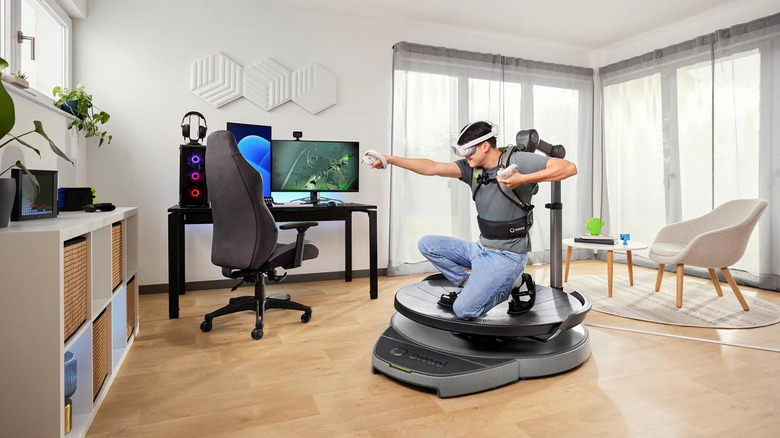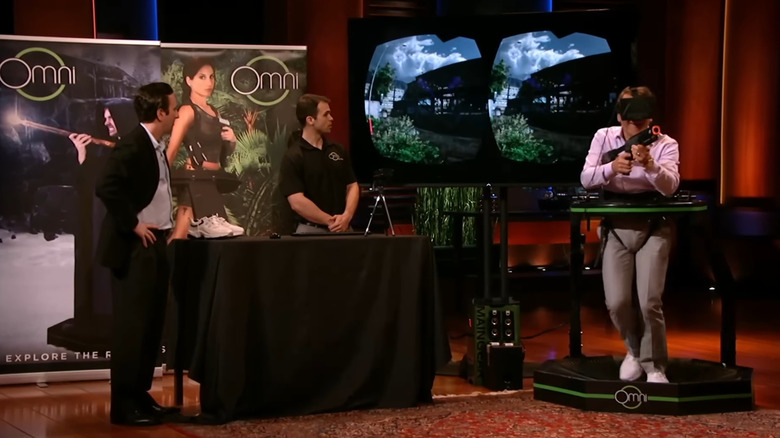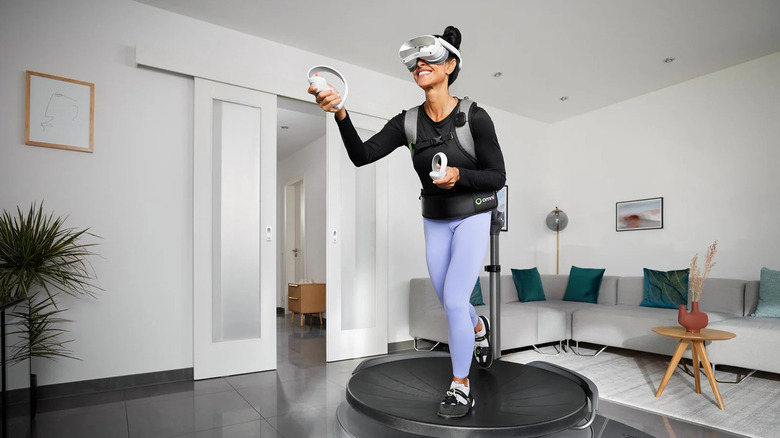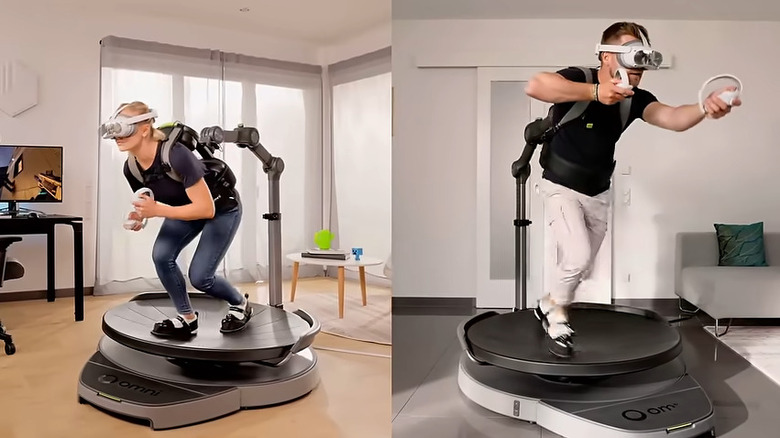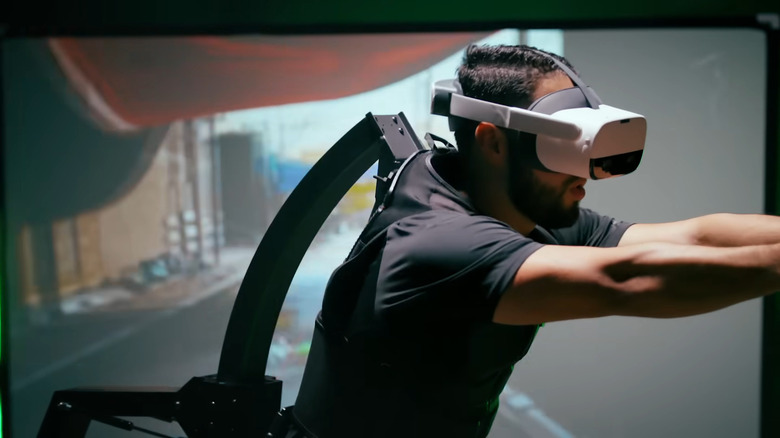What Happened To Virtuix (Omni VR Motion Gaming) From Shark Tank Season 5?
Entrepreneurs on "Shark Tank" typically have big visions for the future of their respective companies, but few have aimed quite as high as Virtuix, which appeared in the same season as other notable companies such as the Cycloramic App and Ilumi Smart Lightbulbs. The company produces a 360-degree omnidirectional treadmill known simply as the Omni that pairs with motion sensing game controllers and a VR headset for a heightened level of immersion, interaction, and activity.
Founder Jan Goetgeluk appeared on the show with hopes of receiving a $2 million investment for 10% of his company — a high ask for a then-burgeoning tech industry. The sharks were nevertheless impressed by the Omni, especially Robert Herjavesc, who got to demonstrate the gaming system during its presentation. Goetgeluk saw the Omni fitting in seamlessly with the promising future of gaming, with VR becoming an increasingly popular platform and the company's Kickstarter campaign exceeding expectations. However, it did little to impress the sharks, who saw issues with the business model, the product itself, and Goetgeluk's $20 million valuation.
Goetgeluk initially worked as a mechanical engineer and investment banker before founding Virtuix in 2013. Noticing the rise of affordable motion sensing and VR headset technology, the entrepreneur sought to create a VR system that allowed for more free movement. A Kickstarter campaign was launched in June 2013 and became an overwhelming success. By the end of July, over 3,200 individuals helped fully fund the campaign, bringing in a final pledge of $1.1 million from a $150,000 goal.
The sharks didn't bite on the Virtuix Omni
Jan Goetgeluk's initial presentation intrigued the sharks, especially Robert Herjavec, who eventually stepped up to give it a whirl. Despite being out of breath while on the machine, he found the experience to be fun and believed that he'd grow accustomed to it after a while. Goetgeluk planned on selling the product for $499, which is far cheaper than the sharks were expecting. However, with the $300 Oculus Rift headset being sold separately alongside any additional accessories, the final cost would be much higher.
Daymond John questioned if gamers would be into the activity aspect, with Goetgeluk stating that the Omni helps gamers stay active while playing. Kevin O'Leary commented on the absurdity of the $20 million valuation. Goetgeluk shared statistics detailing how platforms such as the Oculus Rift, which possessed a similar target audience, were putting out 200 units a day and were predicted to sell at least 500,000 units the following year. If the Virtuix team managed to get a fraction of those buyers, they could potentially bring in $12.5 million in sales.
While many of the sharks saw the Omni's potential, no one went in. Barbara Corcoran believed that the treadmill would eat up too much space in homes and retailers. Robert Herjavec, despite stating he'd be a customer, didn't think that most gamers sought that level of interactivity, a statement that Daymond John concurred with. Kevin O'Leary found the valuation too high at such an early stage, later sharing that he'd show more interest at a $5 million valuation. Mark Cuban believed that the company would struggle to find growth and anticipate industry changes.
The Virtuix Omni has continued to endure after Shark Tank
There are a handful of instances where a company is able to not only survive but thrive even after failing to make a deal on "Shark Tank." Such examples include Ring, whose founder is even starring in a direct "Shark Tank" competitor. Virtuix became one of these lucky few, but it wasn't without a few challenges.
Following the airing of its "Shark Tank" segment on December 6, 2013, interest in Virtuix skyrocketed. When asked if Omni received the intended attention after the show's airing in a Road to VR interview, founder Jan Goetgeluk answered, "Yes, our sales are booming, and our inboxes are flooding. Our daily pre-orders have quadrupled since the show. The marketing and publicity of our appearance has proven invaluable." He added that, while finding many of the sharks' arguments to be flawed, his experience on the show itself was largely positive.
Despite the increased business, the team experienced difficulty in fulfilling orders while realizing that the intended market had yet to be viable enough to sustain the company. They altered their business model and began providing Omni systems to commercial entertainment venues. The end result was a four-person VR enclosure called the Omni Arena, which can currently be found in over 500 worldwide locations. By 2019, the team had inked a deal with Dave and Buster's and raised $20 million from additional backers, including none other than Mark Cuban. "I believe in the Virtuix team and technology," Cuban shared with Forbes in 2024. "They're bringing a revolutionary product to market that enables users to physically move around within virtual worlds. It's a key piece of VR that's been missing."
Virtuix currently sells several different Omni devices
Today, Virtuix Omni is not only surviving but thriving. Following additional funding rounds, the company's original vision of the home-use Omni came into being in September 2024 with the release of the Omni One, giving users a freer range of motion than ever through home VR gaming.
The Omni One and Omni Arena can be purchased on Virtuix's website. The One currently sells for $3,495 plus shipping and comes with a treadmill, VR headset, hand controllers, overshoes, foot trackers, and a cleaning kit, along with a 30-day refund guarantee and a one-year warranty. These accessories, as well as Virtuix's library of game titles, can also be purchased separately on the site. Buyers also get a 30-day trial to Omni Online where members have access to numerous games, can participate in multiplayer tournaments and challenges, and unlock achievements. Afterwards, users can choose between an $84 six-month or a $140 year-long subscription. Those who have an existing VR headset and game library can opt into the Omni One Core, which costs $2,595 plus shipping.
Businesses and venues can also inquire about using the Omni Arena. The site claims that businesses that use its tools see a significant boost in revenue and customer retention. Pricing for the Omni Arena starts at $2,999 a month, with businesses needing to fill out a form to receive accurate pricing.
What's next for the Virtuix Omni?
While it might have been difficult to predict that VR gaming would become an $11.6 billion industry by 2023, the sharks may regret not biting on the Omni. With the release of the Omni One in 2024, Virtuix has the potential to bring in nine figures. Speaking with Forbes in August 2024, Goetgeluk shared, "We're thrilled with the success of our preorder campaign and our community's excitement about Omni One. Omni One is a groundbreaking product that sets us up for rapid revenue growth. Shipping just 3,000 units a month would bring in $100 million in annual revenues. We're ready to scale."
The applications for Virtuix's technology could potentially go beyond entertainment purposes. In a 2014 interview with The Washington Post, Goetgeluk and former Marines adviser Gavin West described how the Omni could be utilized for combat training. "A fire team, squad or platoon could enter the virtual environment and practice immediate action drills, large scale raids, or any other individual or group training standard," West stated. "Any scenario could be created and rehearsed." As of now, the future of Omni looks promising.
